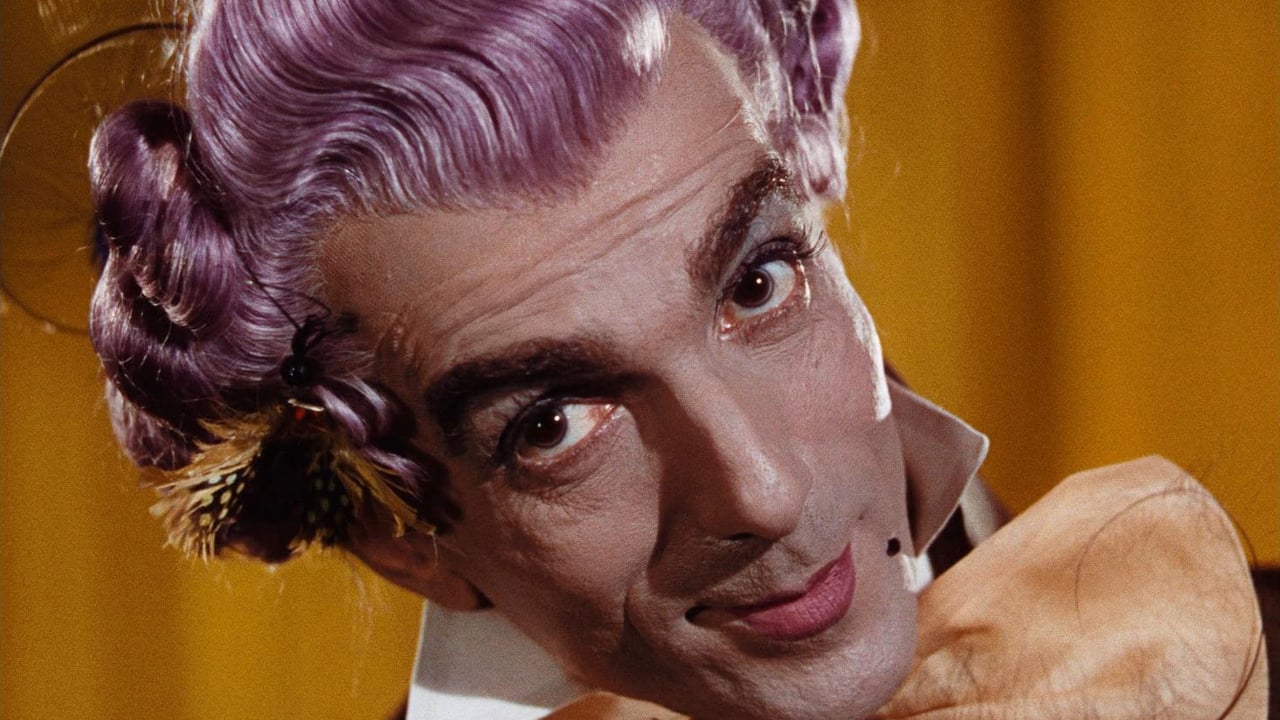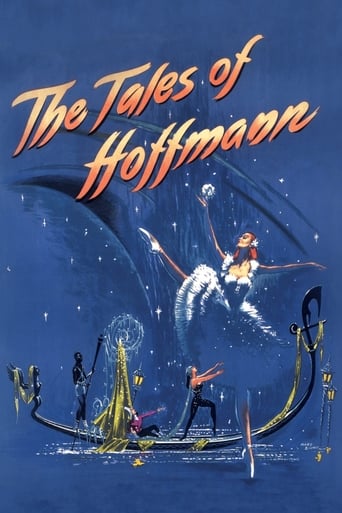

Michael Powell and Emeric Pressburger's misfired attempt to co-mingle the balletic magnificence of their success "The Red Shoes" with the Jacques Offenbach light opera about a German student who gains inspiration through romantic heartbreak. The fiery imagination which fuels the Archers team is only in sporadic evidence here; their uncanny filmmaking techniques (and a playful, often peculiar sense of humor) results in some marvelous bits and pieces, but perhaps the literal structure (or non-structure, as it were) of filming an opera threw the two men off. Editor Reginald Mills gives us some beautiful close-ups of the singers and dancers in a staccato rhythm, and they are worth waiting for, but the expected surreality of the enterprise is lacking, and the music itself peaks and ebbs. ** from ****
... View MoreAnyone who knows me, know that I'm not a big fan of musicals. Though I do like some (Hello Dolly and Reefer Madness to name two of the few selected ones), mostly I try to avoid them, because I'm just not into them. By now you should wonder why I bothered watching this one then. The other thing about me, if you know me, I try not to read anything related to a movie I'm about to watch. And even a "classic" (as it is considered and the fact it's out on a Criterion Collection disc is just another proof to that "fact") as this one went under my radar, so that I knew exactly nothing about it.And still, while I was annoyed at times, the overall feeling was a good one. The fact that I was watching it at the Berlin International Festival (as a part of their retrospective section) in a packed cinema, might have helped elevate it and make me feel good about it. Still some stories were better than others and a few dragged quite a bit. So the overall feeling was mixed nevertheless. But for any self respected musical fan (which I'm not as stated above), this is a must see movie.
... View MoreIt is an issue that can't be really settled: Can opera be blended with motion pictures? I have always felt that one of the most unfair deaths of the early 1920s was that of Enrico Caruso in 1921. Had Caruso been alive after 1927 sooner or later he would have been in motion pictures. With his voice (and stage experience) he would have been a natural in Hollywood. In the early 1930s opera singers like Lawrence Tibbett made films. Caruso would have been at home there. Moreover he occasionally recorded popular tunes (most notably, during World War I, "Over There" and Sullivan's "The Lost Chord"). He probably would have been singing Harold Arlen or Rogers and Hart or Gershwin or Kern.But would they have put on his performances in operas? Tibbett appeared in an occasional operetta like THE ROGUE SONG. But aside from singing an occasional opera song (like from THE BARBER OF SEVILLE) he never did a full opera. Neither did Jeanette MacDonald and Nelson Eddy (who did scenes from real and fake operas in MAYTIME). MacDonald did a scene from Mayerbeer's LES HUEGENOTS, but that four hour opera never was on any studio drawing board. Could they have done I PAGIACCI with Caruso? It's a one actor of about ninety minutes length. Couldn't that have been tried (had Caruso been around)?It really never was tried. Operettas were the limit, such as BABES IN TOYLAND, BITTERSWEET, or THE MIKADO (1939). It would not be until the 1970s when public television would start showing taped operas with Beverly Sills, Paverotti, Domingo, and others. But filming them is still a rarity. One exception to the rule - possibly the best - was THE TALES OF Hoffman (1951) produced by Michael Powell and Emerich Pressburger. It is an unusual choice for that pair, whose movies usually dealt with English society (like THE LIFE AND TIMES OF COLONEL BLIMP). But they had done the very fine THE RED SHOES a few years earlier, to international acclaim, and one senses this may have been a project that slightly expanded. Moira Shearer was the star of THE RED SHOES, and her dancing the ballet was the heart of the movie (and a prelude to the ironic, tragic conclusion). I keep wondering if Shearer suggested Leo Delibes' ballet, COPPELIA to the two producers, which is based on one of the three stories by E.T.A. Hoffmann that are the basis for this opera. COPPELIA is a comic ballet with a happy ending (as opposed to the original story) that would have been under ninety minutes. However, THE RED SHOES had a complete story about an impresario and his star. COPPELIA is about a woman fooling a mechanical doll maker.The opera by Jacques Offenbach is based on several Hoffmann stories sewed together as episodes of failed love told by Hoffman to various students in a tavern while he awaits his new love. The first, OLYMPIA, deals with the same story COPPELIA is from, except that it retains the semi-comic, tragedy of Hoffman's disillusionment with his "lover". Olympia is a doll that is presented to him as a living woman. He falls for her, but she is destroyed by her creator. Shearer was the dancer in this portion of the film (she dances very nicely, her steps perfect even when showing a slight eccentricity in movement due to being a robot). One has to remember - French opera was notorious in the 19th Century for having ballet portions for the ballet dancing mistresses of opera "supporters". Offenbach had known this when he composed his operettas in the heyday of the Second Empire (1851-1871) and he included it in this his final work (his monument as a composer). But Olympia also sings! Shearer doesn't. So she is given a false singing voice - but if you watch her face in the sequence she barely opens her lips! Later she danced the role of Stella, the final girlfriend of Hoffmann. But in the rest of the film the actresses are singers, not dancers.The singers, like Robert Rounseville, are good. The production is rich in color (my favorite sequence a portion of the second story - the one set in Venice, with "The Barcarolle" - where molten colored wax is turned into jewelry). I like opera, so I liked the film. But I wonder how many people unready for opera (or disliking it) would agree with my view.
... View MoreCommendable for its avant garde techniques, this film was no doubt appreciated by Kenneth Anger, Fellini and Mario Bava. The first two acts are pretty solid - Olympia is whimsical surrealism and Giulietta is sensual surrealism. The Antonia segment torpedoes the entire project and I strongly suggest viewers quit at the end of act two, while they're ahead. Powell either ran out of money, ran out of inspiration, or both. Hoffmann's character is essentially written out of the third act and Powell focuses at length on Anne Ayars - a dumpy old thing with no screen presence. For a director who always discovered great looking talent, from Deborah Kerr to Helen Mirren, it seems suspicious that he would want Ayars in one of his most colorful films. One can pretty accurately surmise that she was sleeping with one of the money bags involved in the production. It makes for pretty miserable finale.For Chitty-Chitty-Bang-Bang fans, this film contains a big animated role for Robert Helpmann who played the Child Catcher.
... View More